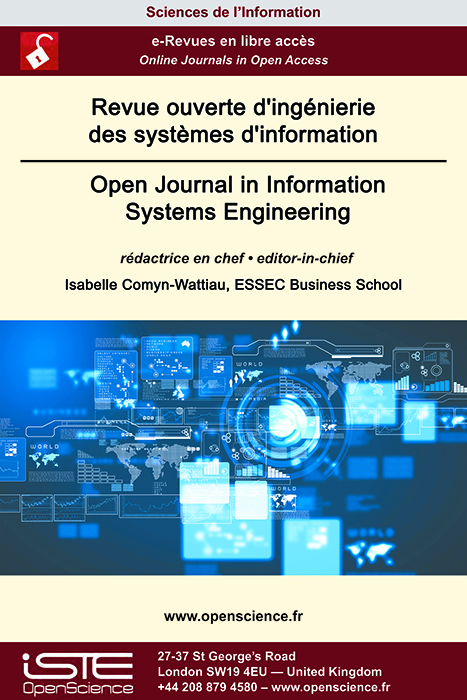

Information and Communication > Home > Open Journal in Information Systems Engineering > Issue
Vous trouverez, dans ce numéro, une sélection d’articles étendus après leur présentation en mai 2018 à Nantes lors de la 36ème édition du Congrès Inforsid.
Document oriented bases allow high flexibility in data representation. This facilitates a rapid development of applications and allows many possibilities for data structuration. Nevertheless, the structuration choices remain crucial because they impact several aspects of the document base and application quality, e.g, memory print, data redundancy, querying and navigation facility. It is therefore important to be able to analyse and to compare several data structuration alternatives. We introduce in this paper our SCORUS project, which aims to assist users in the modeling of data for document-oriented databases. The main contribution is the proposal of a set of structural metrics structural for JSON documents. They mesure several aspects of the complexity of the structure in order to be used in criteria helping in the schema design process. This paper presents the definition of the metrics together with a validation scenario.
The rise in volume of data and information from various sources requires effective information/data filtering to be closer to the user and best meet his/her needs. For this purpose, context-aware recommender systems that take into account the context of the user in their recommendation process, have been proposed. However, there is still no unique definition for context. In this article, we propose a typology of the user context for (context-aware) recommender systems,
in order to overcome the shortcomings of the previous proposals and to answer a rather wide spectrum of application cases. Indeed, this typology is generic with great applicability. We also show how to use it, either in the phase of gathering contextual information, the modeling or the integration within a context-aware recommender system.
Detecting communities of interest is a complex problem that has been approached from different angles. In this paper, we propose a user-centric approach integrating social user profiles in the detection of communities in online social networks. In our approach, we first compute the explicit acquisition of knowledge. By exploring the egocentric networks of users, we can infer implicit similarities of interests. These similarities are estimated with reference to homophilia and social influence. The latter is used to improve sentiment analysis within communities. Finally, we conduct experiments on data sets taken from real social networks.
This article presents three of the contributions presented at the Inforsid 2018 Young Researchers Forum. This article examines the possible contributions of data-oriented network architectures, it seeks to establish a contextsensitive composition of services and it aims to propose a modeling of the filtering mechanisms of large video collections in CCTV systems.

2026
Volume 26- 6
Special Issue2025
Volume 25- 5
Issue 12024
Volume 24- 4
Special Issue2023
Volume 23- 3
Special issue2021
Volume 21- 2
Issue 12020
Volume 20- 1
Issue 1